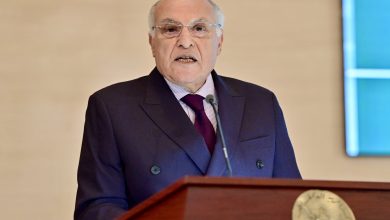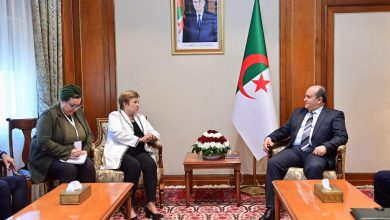Algeria continues to assert its influence on the African energy landscape, with the recent election of Farid Ghazali as the new Secretary-General of the African Petroleum Producers’ Organization (APPO). The announcement was made during the 48th Ordinary Session of the APPO Ministerial Council held in Brazzaville, Republic of Congo, marking a significant moment for Algerian diplomacy and its commitment to fostering intra-African cooperation in the energy sector.
The meeting, which took place on November 4, 2025, saw the participation of energy ministers from APPO member states, alongside representatives from regional and international organizations, and strategic partners in the oil and gas industry. Algeria’s delegation was led by Minister of Hydrocarbons and Mines, Mohamed Arkab, and included Algeria’s Ambassador to the Republic of Congo, the CEO of Sonatrach, Nordine Daoudi, and the President of the Hydrocarbons Regulation Authority (ARH), Amine Remini. The session was presided over by Bruno Jean-Richard Itoua, the Republic of Congo’s Minister of Hydrocarbons and the President of the Council for 2025.
The Ministerial Council addressed a range of crucial organizational and strategic issues. These included an assessment of the APPO Secretariat’s activities throughout 2025, a review of the work program and budget for 2026, and discussions on strengthening African collaboration in exploration, production, and technical capacity building. A key focus was on the prospects for African partnerships amidst global energy transition trends, with ministers emphasizing the importance of maximizing local content in the oil and gas industries as a cornerstone for sustainable development and value creation within African economies.
Minister Arkab actively participated in the signing ceremony of the “Brazzaville Agreement on the Development of Local Content in the Petroleum and Gas Industry in Africa.” This agreement, adopted by the member states’ ministers, demonstrates a collective commitment to enhancing the participation of national expertise and institutions in energy value chains. The agreement aims to:
* Develop effective mechanisms for measuring and evaluating local content policies in member states.
* Empower African suppliers to provide high-quality goods and services to the petroleum and gas industry.
* Facilitate access to financing and technology for local businesses.
* Promote knowledge transfer and build African human capacity.
* Support partnerships between international and local companies based on a win-win approach.
* Harmonize regulatory frameworks for local content at the continental level.
* Encourage research, development, and innovation.
* Reinforce principles of transparency and efficiency in the implementation of energy policies.
The Brazzaville Agreement is a clear call to action for enhanced African collaboration, promoting solidarity to build a robust and integrated petroleum and gas industry that contributes to the prosperity of the continent’s citizens.
For more information about Algeria, check our dedicated section.
The election of Farid Ghazali as the new APPO Secretary-General was a highlight of the closing session. Ghazali secured the position with a majority vote from the member states, recognizing his extensive 33-year career in the energy and hydrocarbons sector. His appointment is widely viewed as a testament to his experience and leadership.
Ghazali’s career includes several key leadership roles within Sonatrach, Algeria’s national oil company. He served as an Advisor to the CEO since March 2020 and as Vice President in charge of Strategy, Economic Studies, and Corporate Planning between 2017 and 2020. He also held the position of Director of Studies and Planning in the Hydrocarbon Pipeline Transportation division and served as an executive responsible for the Trans-Saharan Gas Pipeline project. His background showcases a deep understanding of the oil and gas industry, strategic market analysis, and project management. Ghazali has also contributed to energy-related matters within international organizations such as OPEC and the Gas Exporting Countries Forum (GECF). He holds a degree in Chemical Engineering from the Algerian Petroleum Institute (IAP), specializing in Liquefied Natural Gas (LNG).
Addressing the Council, Minister Arkab reaffirmed Algeria’s unwavering support for APPO’s goals and initiatives aimed at empowering Africa to exploit its natural resources fairly and efficiently. He emphasized the importance of implementing continental cooperation projects, notably the African Energy Bank, and supporting co-financing initiatives for energy infrastructure projects. Arkab also called for the continued reform of the organization and the reinforcement of good governance and transparency principles. He expressed confidence in the new Secretary-General’s ability to lead a new phase of African development and integration.
The APPO meeting coincided with the fourth edition of the African Conference and Exhibition on Local Content (CECLA 2025), held under the patronage of the President of the Republic of Congo, Denis Sassou Nguesso. The event, inaugurated by the Congolese Prime Minister, provided a platform for exchanging experiences and best practices in developing local capabilities and enhancing value addition in the African economy.
Founded in 1987 at the initiative of Algeria and several other African oil-producing countries, APPO serves as an institutional framework for coordinating petroleum policies among member states. It aims to promote cooperation in exploration, production, refining, and technology transfer, as well as supporting scientific research, training, and skills development. Currently, APPO comprises 18 member states, working collaboratively to shape the future of the African energy sector. The election of Ghazali and the commitments made at the Brazzaville meeting signal a renewed focus on strengthening African energy independence and maximizing the benefits of its resources for the continent’s development.




